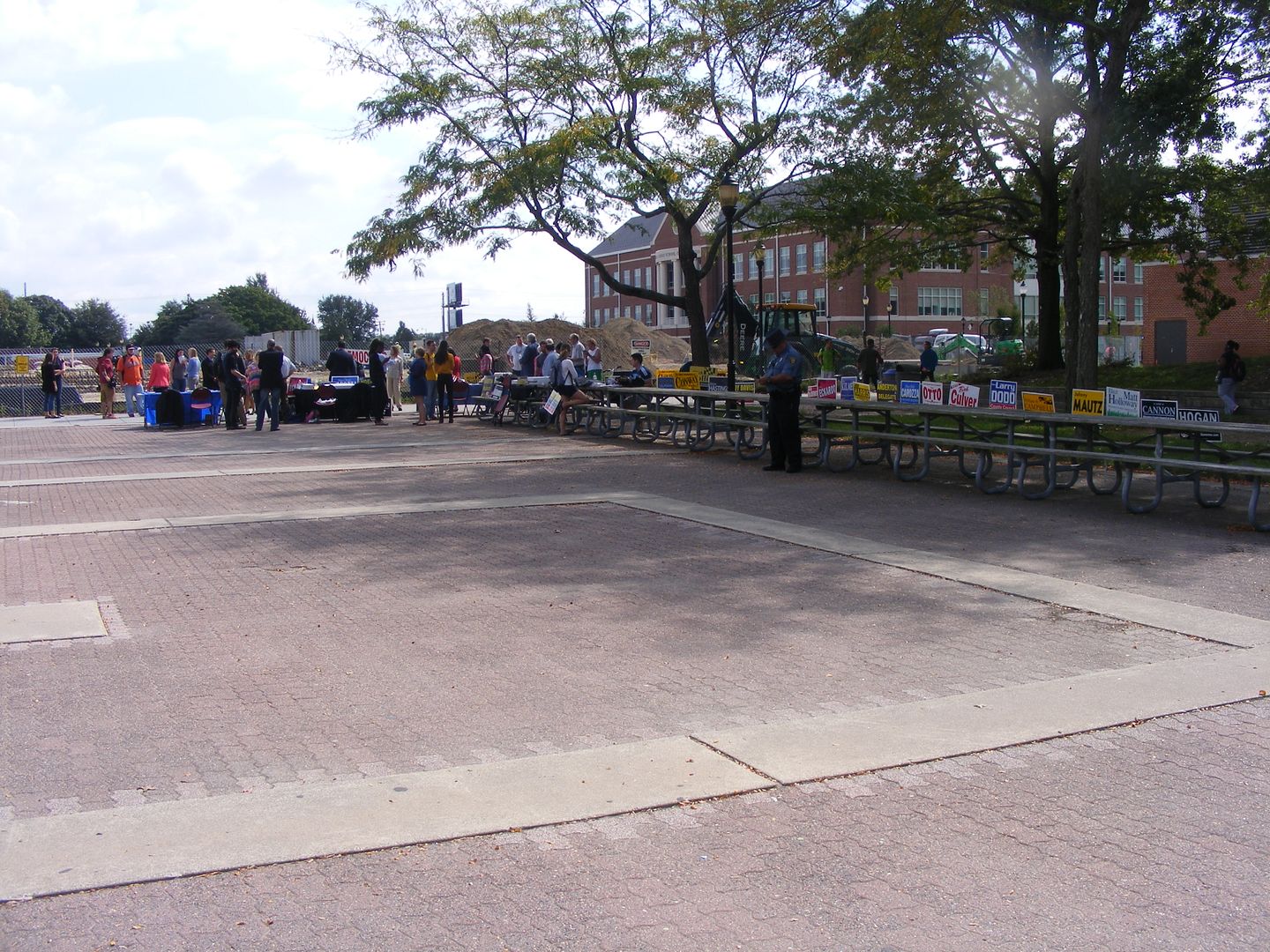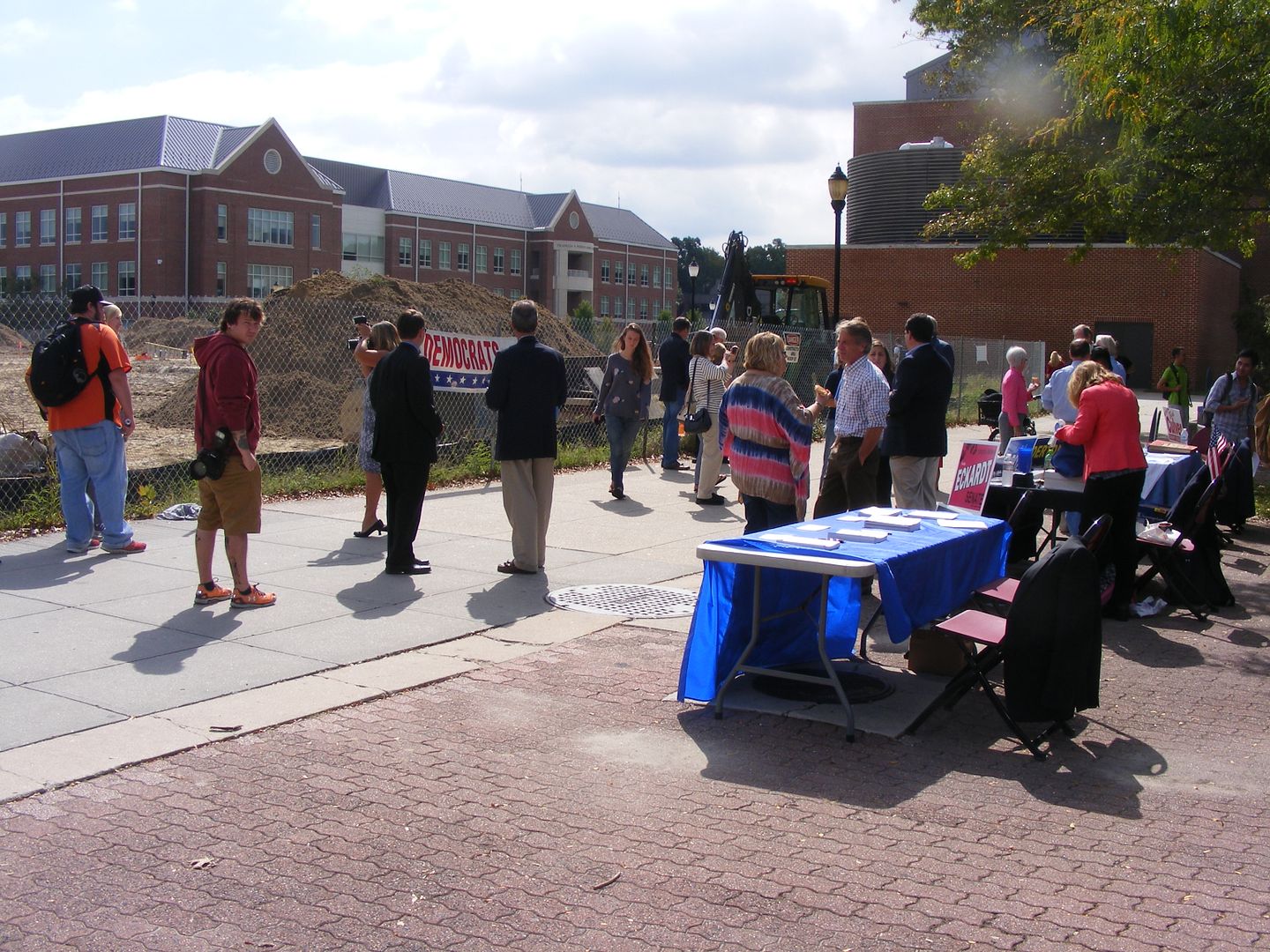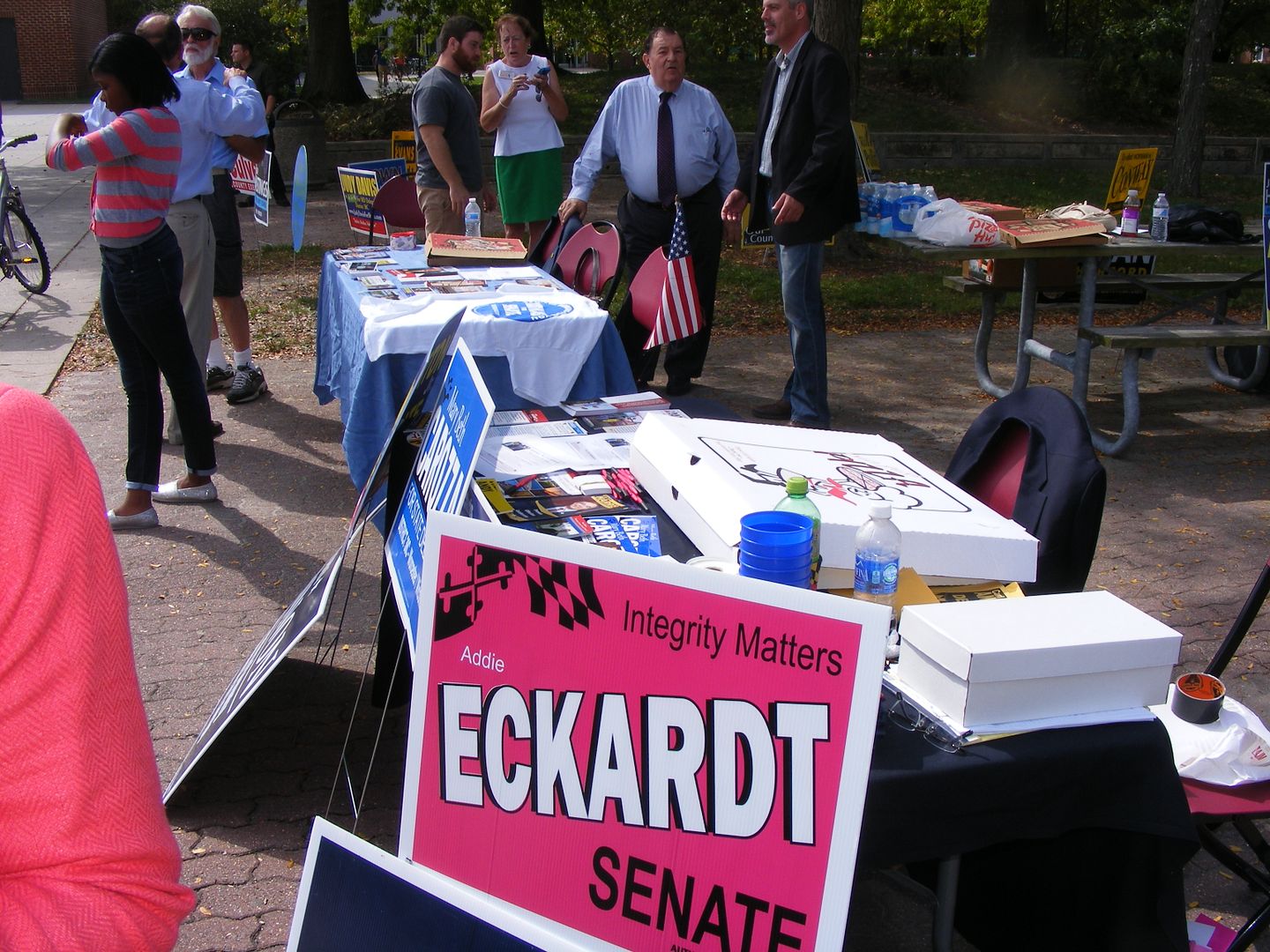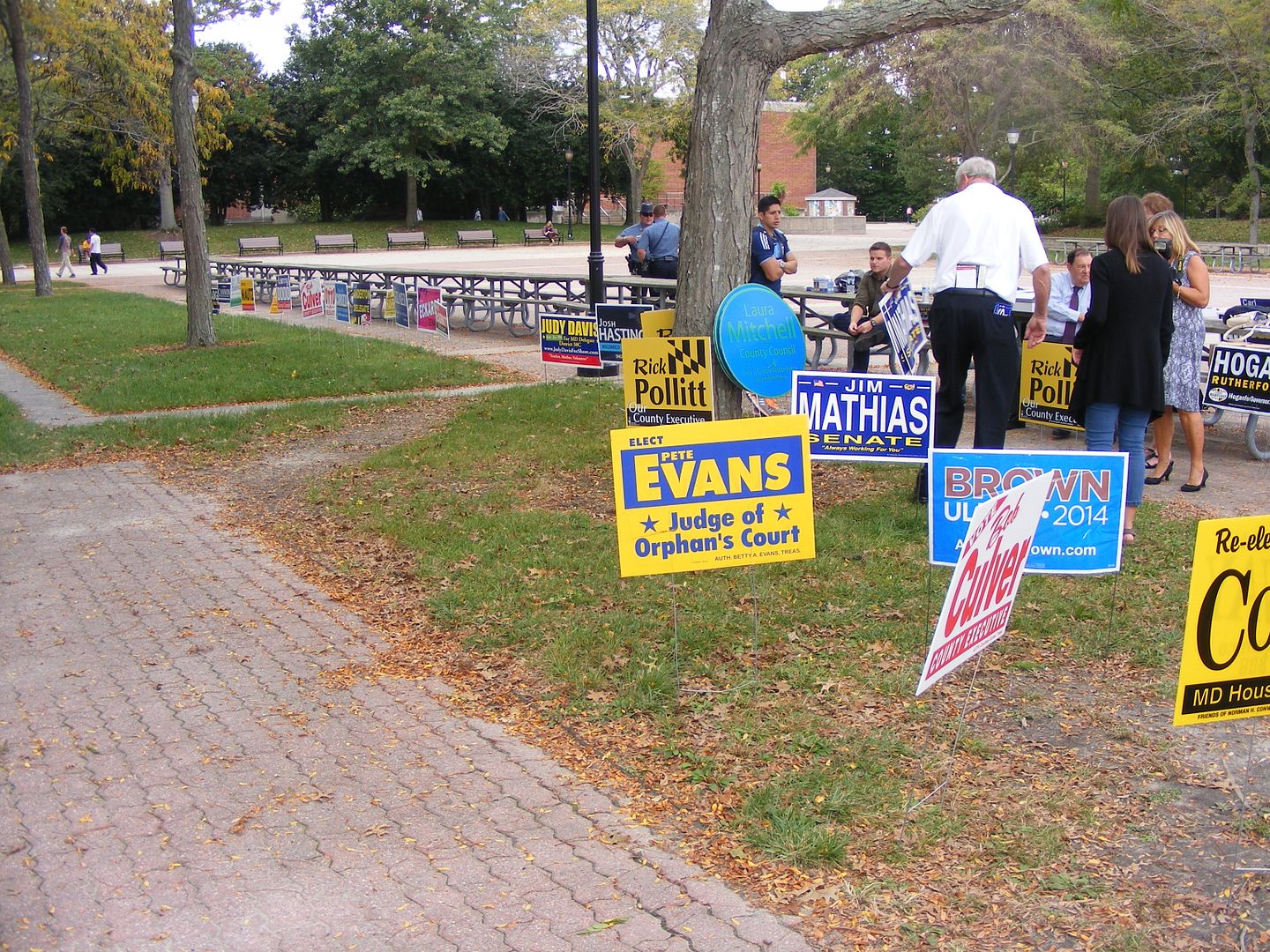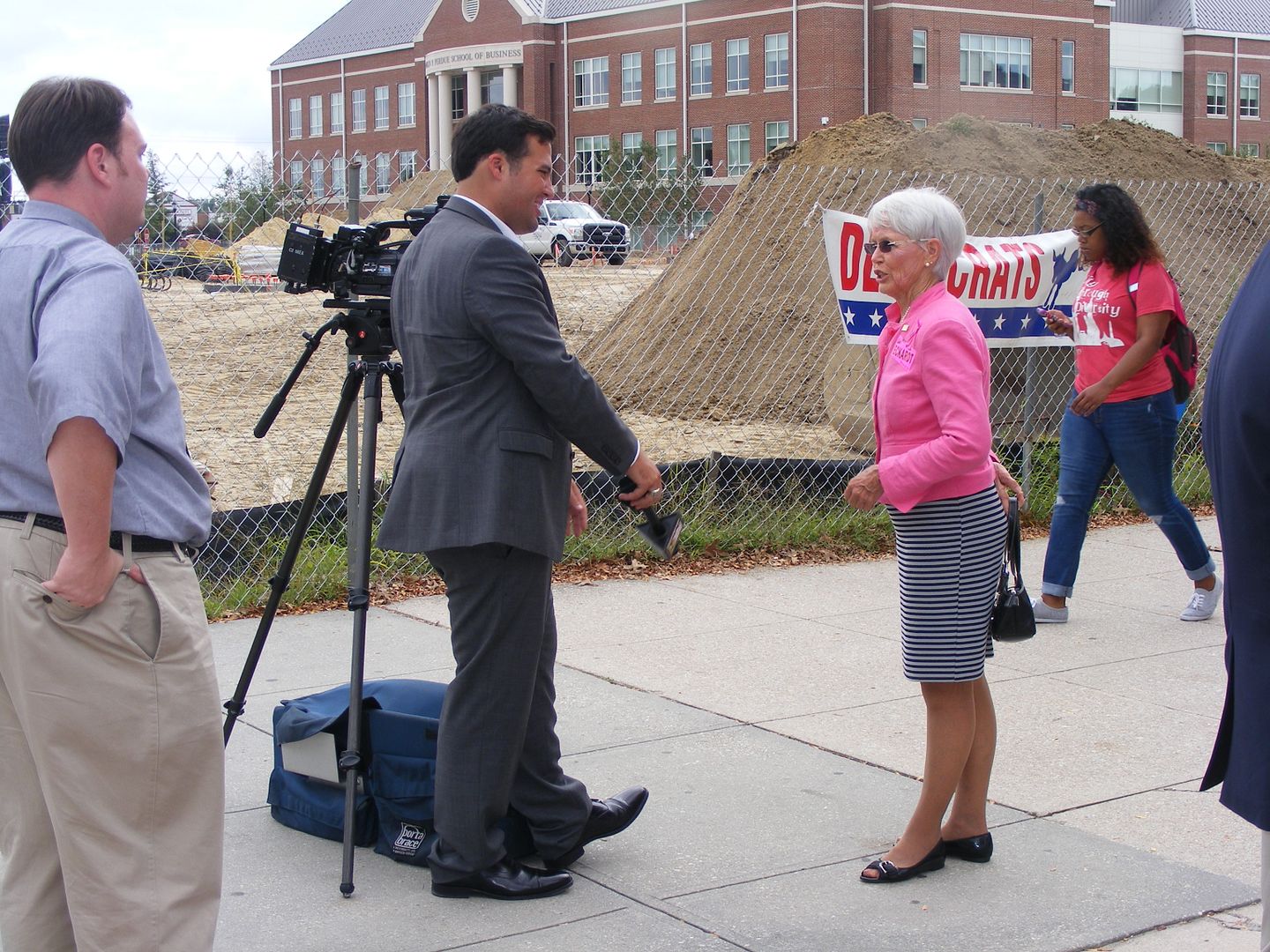Yesterday I discussed what was said by the county-level candidates at this forum, so today I’m covering the six hopefuls who represented District 37: Addie Eckardt and Chris Robinson for the Senate seat, and Christopher Adams, Rod Benjamin, Keasha Haythe, and Johnny Mautz for District 37B.
Of the two seeking the Senate seat, Eckardt has by far the most political experience as she was elected as a Delegate in 1994, serving in the House ever since. At the eleventh hour this cycle she dropped her quest for a sixth House term and jumped into the Senate race, defeating longtime incumbent Senator Richard Colburn in a bitterly-contested primary. Robinson, on the other hand, is making his second straight bid for the Senate seat after losing to Colburn in 2010. He could be considered a perennial candidate as he’s also run unsuccessfully for Congress in 2008 and 2006, twice finishing second in the First District primary. Chris was also a last-minute addition after original Democratic candidate Cheryl Everman withdrew.
Their first question had to do with the retirement climate in Maryland, which is bad, but relevant to the district as a number of retirees live along the Chesapeake Bay. Eckardt properly noted the state’s poor showing in rankings of best states to retire in, but added that we needed to look at tax policy across the board, along with addressing the “duplicative nature” of our regulatory system.
After stating that “our jurisdiction is no different than any other jurisdiction,” Robinson agreed that we had to “ratchet back” spending and not raise taxes. But on the second question about the Affordable Care Act, Chris made the case that “it hasn’t worked its way through the country,” and while the rollout of the state exchange was “botched” he thought the emphasis on preventative care was worthwhile. “Give this process a chance,” he concluded.
Eckardt told us that the “good news” about the state’s adoption of Obamacare was the Medicaid expansion, which she believed should have been done first before the exchanges. With it being done in its present manner, premiums were up and employers were dropping coverage. She believed the states needed to promote change at the federal level.
When asked about key real estate issues, Addie wanted to bring together mortgage holders and first time homebuyers by conducting an inventory of tax sales and foreclosures. Meanwhile, Robinson wished to “put points on the board” by making towns exciting and vibrant, calling on builders to create quality homes.
I found Robinson’s closing statement to be intriguing, as he said he was “inspired” by Rick Pollitt and Norm Conway. “I want to be just like them,” he said. Eckardt stressed the power of communication to solve problems, and pledged to be focused and deliberate.
To be honest, I didn’t see Robinson saying or doing anything which would suggest he’ll do much better than the 40 percent he got last time against Colburn. He tried to portray himself as a fiscal conservative, but in this region it’s tough to out-conservative the Republicans.
In contrast to the veteran presence of Eckardt and the perennial candidate in Chris Robinson for the Senate race, the House of Delegates will have two new representatives. Those representatives will have to pay attention to southern and western Wicomico County, which has felt underrepresented in the past based on the thrust of the opening question.
As it turns out, Christopher Adams is from Wicomico, so he stated the obvious: he will be a resident delegate, focusing on our municipalities and business. That business background led him to pledge that “my customers will be my constituents,” regardless of where they live in the district. But he also stressed that we have to start “winning the argument” against the Democrats.
Keasha Haythe replied that she was used to working across county lines as an economic development director, so working with Wicomico County residents wouldn’t be an issue. Similarly, Rod Benjamin pointed out the similarities between his home area in Church Creek and the area of western Wicomico County.
Johnny Mautz noted that he had spent a lot of time in Wicomico County and would work with its local and municipal governments.
This quartet got perhaps the strangest question of the night, one which asked about the effects of climate change and flooding.
Mautz indicated his belief that the state should help flood-prone landowners, but reminded us the flood insurance rates are based on federal mandates.
Benjamin also believed the flood insurance cost was “unfair.” And climate change? “Truth is, I don’t know what the truth is,” he said, noting that he’d seen some extreme tides recently.
Haythe believed we needed to be proactive about the sea level rise, stating it’s already affecting the planned Harriet Tubman visitor center.
But Chris Adams turned the question on its head, taking issue with subsidized government interference. The Eastern Shore, he said, “should be pro-growth, pro-construction.” He also objected to the federal government turning a significant part of Dorchester County into a national park, warning that it would adversely affect private property owners in the area who would lose their rights.
Adams stayed in that vein during the “realtor” question, making the case that Sussex County, Delaware was the prime beneficiary of Maryland’s mistakes, which include a prospective 64% property tax increase because of our state’s growing debt. He pledged to be business-friendly, saying “I’m about jobs.”
Haythe thought a path to success for realtors involved taking advantage of state and federal programs, and leaning on pros (like herself) who know how to create jobs.
Land use was “a large concern” to Johnny Mautz, as were taxes.
Benjamin was asked a little later on about this question, and made the case that local control of issues is preferred. He also offered that the “tier system is better than the smart growth system.” He also proposed a Startup Maryland program, based on a program Wicomico County already has in place for tax abatement.
Later, in his closing statement, Rod told us all we had homework: tell others about what was said tonight. He repeated a mantra of “reduce taxes, reduce government.”
Reducing taxes was also on the agenda of Johnny Mautz, who told us “my word is my bond.”
Keashe Haythe encouraged us to consider both her track record of results and her “human American platform.”
Finally, Christopher Adams begged Annapolis to “leave us to our Shore way of life.”
To me, this was the weakest link in the debate. The questions were relatively uninspiring and most of the answers were fairly rote. One interesting aspect of the House of Delegates discussion was that Rod Benjamin was openly trying to sound as conservative as the Republicans. (In fact, I ran into him at the Autumn Wine Festival and his tone was relatively the same.) On the other hand, Keasha Haythe wanted to make us believe that an economic development director could create jobs.
Yet I did a quick bit of research into Dorchester County’s job creation and retention since 2009, and it shows their labor force has declined by 921 people in five years, with 554 fewer unemployed but 367 fewer actually working. Since she began her job in 2008, Dorchester isn’t doing all that well and one could argue it’s state policies holding her back – policies which emanate from her party. Perhaps it’s something which a woman who’s worked in the public sector for over a decade may not understand.
On the other hand, Adams and Mautz both run businesses so they have created jobs and added value. (Both also support this local blog.)
To me, it was telling that almost all of the candidates tried to convince the crowd of their conservatism. It was much the same in District 38, although there were a disappointing number of omissions. More on that tomorrow.


